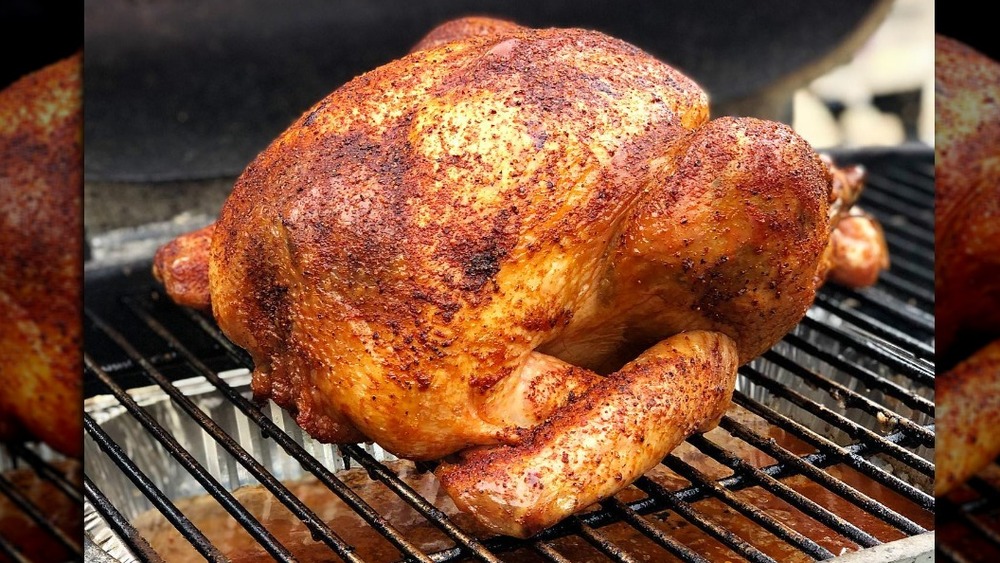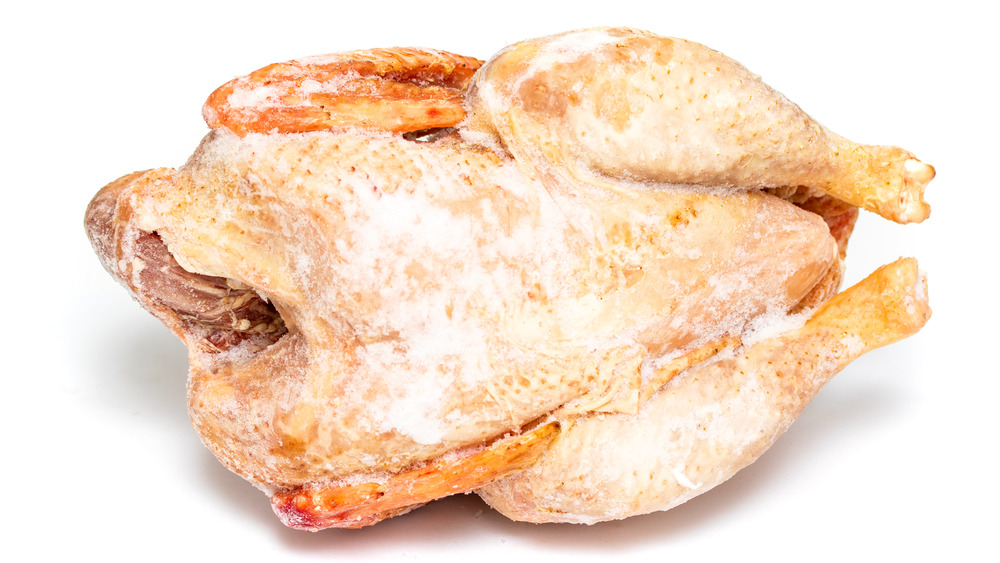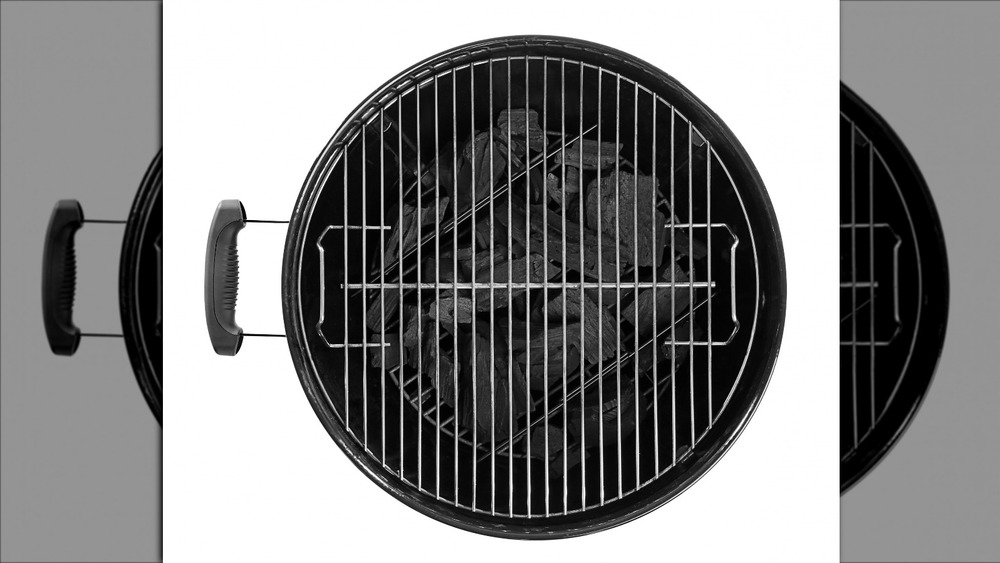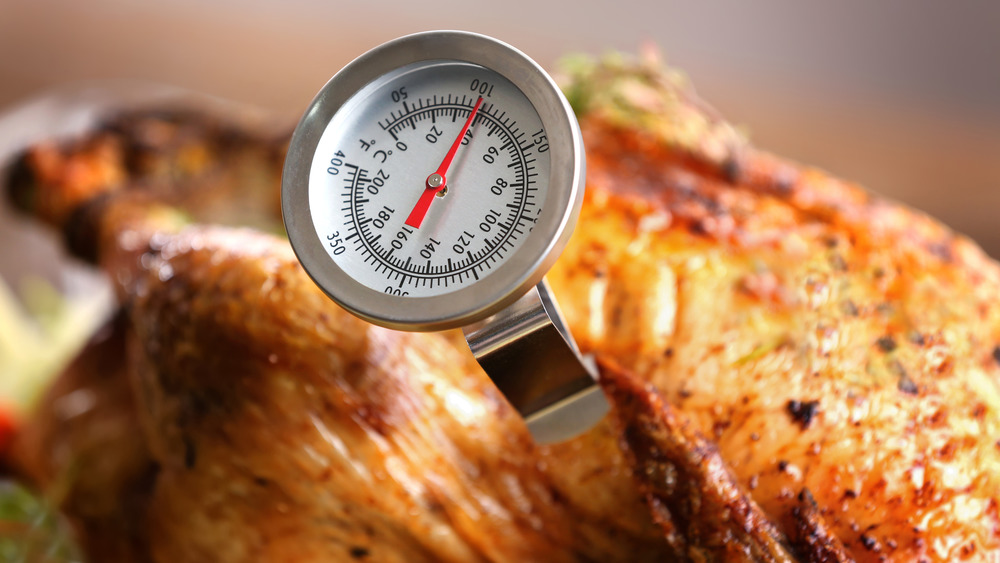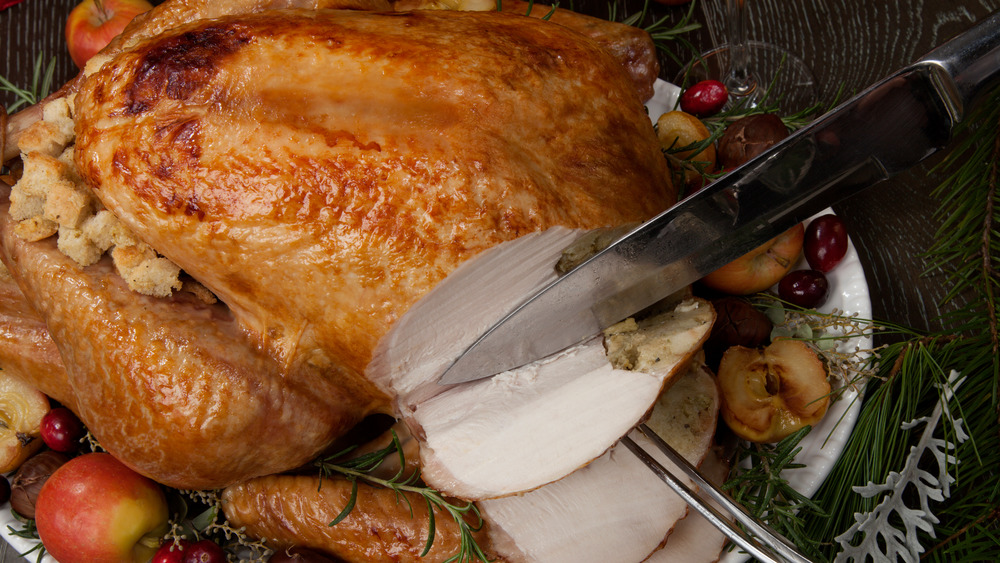The Biggest Mistakes Everyone Makes When Grilling Turkey
There are many ways to cook a turkey, although some may be better than others. Deep-frying, for example, may result in a super-tasty bird, but do you really want that many gallons of boiling oil on the premises? Danger, danger! Roasting is relatively easy but may seem a bit too tame for some, plus it does have the tendency to heat up the house so might not be something you want to do if your turkey-cooking activities are taking place in a warmer climate or at a hotter time of year. (There's no law, after all, saying turkeys are only for Thanksgiving and Christmas)
If you're a fan of outdoor cooking, you could smoke your turkey, but if you want a more traditional taste, then grilling your turkey might be the best method for you. Perhaps you've tried this method of turkey cooking, though, but the results weren't all you expected? Kevin Kolman, Weber's Head Grill Master, says it's actually not all that difficult to grill a perfect turkey as long as you avoid a few common pitfalls.
Don't buy the wrong size bird
Kolman says your journey to turkey Nirvana begins in the supermarket (or on the farm, if you're someone who wants the freshest possible turkey and doesn't find it macabre meeting a few of your soon-to-be-dinner's still-living relatives). He says that you'll want to avoid not having enough turkey to go around, and you'll also want some for leftovers, although presumably there's also such a thing as buying way too much turkey and being stuck with more than you can manage to eat before it goes bad.
Kolman says you'll first need to know how many people you're expecting to serve, so hopefully, your guests aren't last-minute deciders. Kolman recommends one pound of turkey for each person, saying "this guideline will ensure that there's more than enough turkey to go around the table, with extra for those amazing turkey sandwiches the next day," although it won't provide so much that you'll have to put up with those not-so-amazing turkey sandwiches the day after that, or those please-spare-us-the-torture turkey sandwiches appearing on the menu three days out.
No, you can't grill a frozen turkey
While it is quite possible, and even desirable, to cook a still-frozen steak, a large bird like a turkey will not fare at all well if you try to cook it without thawing it ahead of time. And with turkeys, as big as they are, we're talking days, not hours, of thawing time needed. Kolman says "I recommend thawing your turkey in the refrigerator, giving yourself a day for every 4-5 pounds of turkey," and adds that a large turkey (around 20 pounds) may take up to 5 days to thaw. Needless to say, grilling (or any other method of cooking) a turkey of this size will require some serious advance planning.
Avoid cooking over direct heat
Kolman, the grill master, advises that it's very important to set up your grill correctly, since "grilling with indirect heat is essential to slow-roasting your turkey." He says if you have a gas grill, you should keep the center burner turned off and set the outside burners to low or medium heat. For a charcoal grill, you will create what he calls " a three-zone split fire" by banking up 25 to 30 hot briquettes on each side of the fuel grate and placing a large drip pan in the middle that will collect the turkey drippings. If you have a pellet grill, you'll also be using a drip pan, this one placed in the center below the cooking grate and half-filled with room temperature water. (Oddly specific, yes, but why contradict a grillmaster?)
No matter what type of grill you're using. Kolman advises placing the turkey right in the middle of the grill as this will allow the heat to circulate evenly around it.
Don't start cooking too late in the day
Grilling a turkey is a time-consuming process. As Kolman says, "Low and slow grilling requires time and patience for a flavorful and completely cooked turkey." While your grill time may vary, depending on the weight of your bird, Kolman says a good rule of thumb is 23 to 27 minutes per pound when cooking at 225 to 250 degrees F, 18 to 21 minutes per pound at 275 to 300 degrees F, or 11 to 13 minutes per pound at 350 to 375 degrees F.
Kolman mentions the fact that there's now such a thing as "smart grilling" technology such as Weber Connect which, of course, isn't smart enough to actually cook the turkey for you but will at least let you monitor the grill temp via app. According to Kolman, "this technology takes away any stress or guesswork and frees you up to work on side dishes or hang out with your guests," and he even calls it "your secret ally to the best tasting, perfectly grilled turkey." If you're doing it old(er) school with a meat thermometer, though, he says the thickest part of the turkey breast should reach 165 degrees F when it's done, while thighs should read 180 degrees F.
Wait before you carve
Having said that about the temperature, however, Kolman walks back his advice a bit to suggest taking the turkey off the grill just before the temps reach that 165/180 point since your bird "will continue to cook as it rests, raising the internal temperature by 10 to 15 degrees." He says to put the turkey to the side, either in a dry cooler or an oven, for 20 to 30 minutes for a well-deserved rest. He says this rest "allows the juices to run back into the meat, adding moisture and flavor," and will allow you some time to "whip up your sides" (assuming they're of the canned cranberry sauce/store-bought pumpkin pie variety, that is). He goes on to say "once you're finished, your delicious turkey will be ready to slice and serve."
And, as a fun bonus activity, if you used a charcoal grill, you can even toast marshmallows over the cooling briquettes! Bet those would be pretty tasty on top of that pie...
